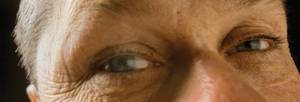University employee finds light in the darkness

Photo: Josh Harrell/Iowa State Daily
October 8, 2008
He stood at an intersection in downtown Des Moines, nothing ahead but a sea of black.
“I want you to cross the street,” his teacher had told him, but as he edged closer to the curb, he hesitated.
He had only been blind for a matter of months. The final surgery that could have saved his sight had failed, and at 23 years old, Clay Gurganus was just learning to walk. Again.
“I think I stood at that corner for 15 minutes and a car never did come,” Gurganus said. “I finally just went, and I got across the street.”
Gurganus, enrollment services advisor for student financial aid, lost his sight in 1983 after being diagnosed with diabetes at the age of nine.
“Diabetes is the number one cause of blindness for people under 21,” Gurganus said. “The first thing people say is, ‘Well, didn’t you take care of yourself?’ But diabetes in 1968 was a pretty new thing on the horizon.”
His sight slowly began to deteriorate, and after several years and numerous attempts at corrective surgery, the doctors gave the final word. There was nothing else they could do. He was blind.
“When they told me they couldn’t do anything else, I will admit that I cried. But the thing that got me through the blindness was my stubbornness,” Gurganus said. “I was 23 years old, and I wasn’t going to give up. I don’t think I ever thought that life wouldn’t go on.”
Fortunately, he and his parents had planned ahead and had gotten a foot in the door at a rehabilitation center long before he lost his sight. In fact, Gurganus said that when he went to his first meeting at the Department for the Blind, he drove.
At the Department for the Blind, he relearned everything he had been doing for 23 years, like navigating city streets, frying eggs and reading books. He said he was even required to take a course in woodworking — not to become a carpenter, but to gain confidence. Gurganus said many people respond with awe when they hear that he can use power saws and wood lathes, but when asked whether he ever hurt himself cutting wood, he smiles, lifts both hands and wiggles his fingers. “They’re all here!”
“I’m sure there have been some blind people who have cut their fingers, but there’s also a lot of sighted people that cut their fingers off. That’s the issue here. Because it’s a blind person it’s a big deal, but it’s not a big deal when a sighted person does it,” Gurganus said.
That’s why he said he struggles with events that try to raise disability awareness by having people walk around with blindfolds or spend a day in a wheelchair. He said these types of programs may accurately portray what it is like to be disabled at the beginning, but not what it is like to actually live with a disability.
Gurganus said many people live in fear of becoming disabled, and doing things like spending a day blindfolded only serve to increase that fear. He compares it to when he had to cross that intersection for the first time. He was paralyzed by fear at the time, but after 25 years, he’s learned to live confidently.
“I don’t travel in fear. I don’t do things in fear. I don’t run power saws in fear. Life’s just different — I do stuff differently,” Gurganus said.
Gurganus lives in Ames with his wife, Jamie, who is also blind, and their two children, Alex and Aliya, who are sighted. He and his wife regularly speak at schools and organizations in the community to educate about blindness. He is a brown belt in Hap Ki Do and said he enjoys spending time with his family and working on his house.
“My wife and I, we may be blind, but we’ve got it pretty good,” Gurganus said. “We’ve both got jobs, we’ve got two kids who are doing well in school. We’ve got food, we’ve got shelter. We’ve even got a big screen TV that we can’t even watch.”
Disabled or not, quality of life is ultimately determined by attitude, Gurganus said, and whether you have the courage to step out into that intersection when faced with the unknown. He said he is hopeful that technology will someday allow him to completely regain his sight, but until then he is thankful for the life he has.
“My friends know me for what I call The Cardboard Box Theory,” Gurganus said. “If you think you’ve got it bad, you could be living in a cardboard box.”
















